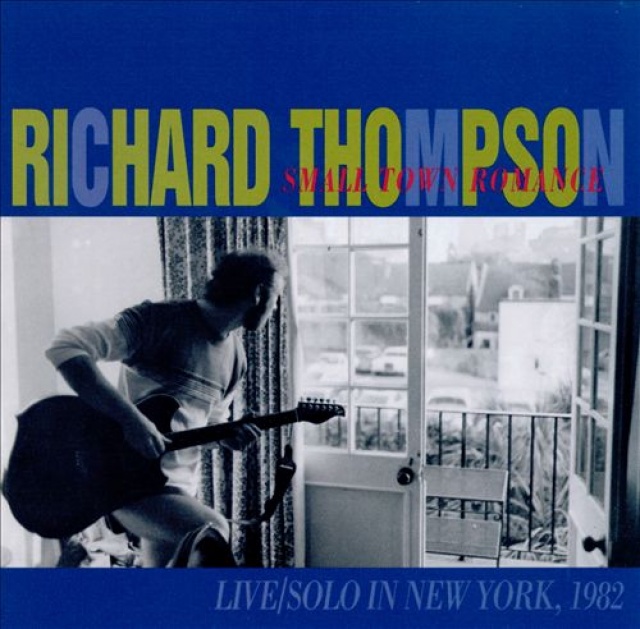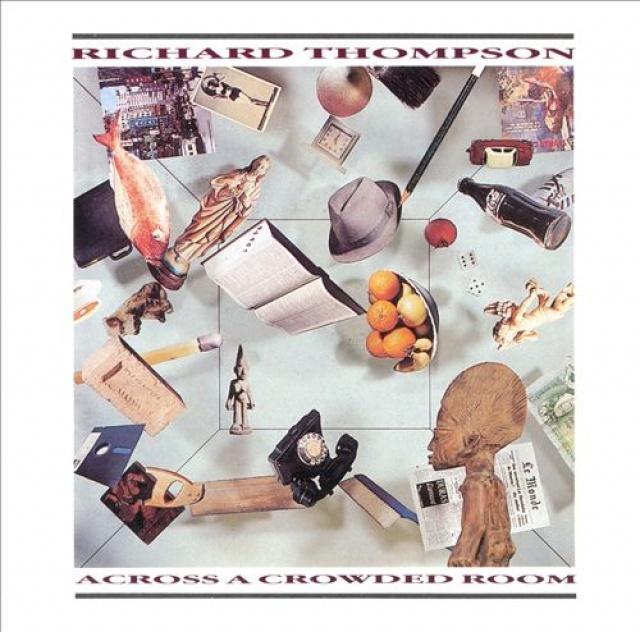[ad_1]
A number of lazy months later, Warner Brothers issued Henry the Human Fly within the States. A handful of folkie “weirdos” – Richard’s time period – snatched up copies. It could be the poorest-selling file in Warner historical past.
“As uncommon as hen’s tooth,” Richard mentioned, in an interview with AllMusic. “Promoted zero, and never an appropriate file for the American viewers, actually, as a result of it’s miles too parochial, far too British. Worst-selling ever, by which I take nice pleasure.”
Richard Thompson must be wealthy and well-known. He has roughly the identical pedigree as Eric Clapton and David Gilmour and Jimmy Web page, all gifted guitarists from England with ample songwriting chops to guide bands and promote information and invade America.
However Richard’s ship by no means actually set sail. He got here of age in Fairport Conference, on the vanguard of a British folk-rock motion that produced many effective albums however no smash hits even in England.
The good Greil Marcus, writing within the outdated Rolling Stone Document Information, termed two early Fairport albums “essentially the most distinctive and satisfying folk-rock LPs since the Byrds’ first.” The second Fairport album, titled What We Did on Our Holidays in Britain and Fairport Conference within the States, boasted attractive songwriting from virtually each band member alongside stirring covers of Dylan and Joni Mitchell. The third file, Unhalfbricking, leaned in on Dylan with stirring outcomes. The band’s uniquely British tackle folks music outdated and new reduce an interesting distinction to the American electric-folk stylings of McGuinn and firm. The fourth Fairport providing, Liege & Lief, took a tough flip towards conventional British folks. Rolling Stone dismissed Liege on the time, however many critics embrace it now as Fairport’s superb peak. All three albums endure as folk-rock classics. None cracked the Prime 10 on the U.Ok. album chart.
“It was at all times our ambition to write down songs that appeared like they have been outdated,” Richard mentioned. “We felt, the Brits are gonna love this, they’re gonna embrace it. However sadly, they saved listening to the Stones and the Moptops.”
Richard made yet one more file with Fairport, the superb Full Home, earlier than leaving the band and launching a short-lived solo profession. After a single album, he expanded to a duo along with his new spouse, the previous Linda Peters, one of many most interesting folk-rock singers in England. Richard and Linda Thompson fared worse than Fairport, a minimum of in industrial phrases. However the pair produced a minimum of two landmark albums. I Wish to See the Vibrant Lights Tonight, launched in 1974, swooped forwards and backwards from jubilation to heartache, generally in the identical track, as Richard celebrated new love and exorcised outdated demons in a brace of extraordinary compositions. Shoot Out the Lights, launched in 1982, chronicled the couple’s disillusion and stands as one of many nice breakup albums. The nearer, “Wall of Loss of life,” activates a love-as-carnival-ride metaphor that will absolutely transfer Springsteen to tears.
Each of these information pop up periodically on lists of biggest rock albums. Fairport enjoys its personal forex, born of infinite touring and annual festivals: the band has remained energetic on and off since 1967.
Much less celebrated, by comparability, are Richard’s nice solo recordings. He has launched greater than twenty full albums as a solo performer, a discography amassed earlier than, throughout and after his decade-long partnership with Linda. Maybe none fairly scales the heights of the 2 well-known “Lights” LPs. But, the very best of them rank as basic exemplars of songwriting and guitar craft: They belong in any respectable file assortment. Here’s a sampling, beginning with Richard’s first, doomed solo effort.
 Henry the Human Fly, 1972
Henry the Human Fly, 1972
Richard’s solo debut drew so little discover, it is onerous to seek out archival proof that it ever existed. I needed to monitor down a “coming quickly” reference from the Could 27, 1972, Document Mirror to affix an approximate date on its U.Ok. launch.
(I’ve some expertise with poorly chronicled album releases, having searched a whole lot of journal and newspaper listings to assign tough dates to unheralded B.B. King albums for my biography King of the Blues. In Henry‘s case, I searched far and vast and managed to seek out two “coming quickly” references from late Could in British journals, Document Mirror and Melody Maker. Richard’s memoir and an earlier Patrick Humphries biography don’t give even approximate dates, presumably as a result of the biographers didn’t have them. As for Henry‘s American launch, the earliest evaluation on the huge Newspapers.com database appeared in January 1973, within the Chicago Tribune. Many on-line sources give earlier dates, however I discovered no strong sourcing on any of them.)
Richard wrote the twelve songs with chord modifications and lyrical themes that plumb the depths of British folklore. “I am writing these very private, very eccentric songs,” he recalled. “I simply determine, this album’s for me. It isn’t for Fairport. I left Fairport as a result of I could not see the place these songs are gonna go.”
They’re lovely songs: Right here, as on the Fairport albums, Richard produced new materials that stood up simply effective alongside Dylan covers and centuries-old folks classics. Maybe listeners thought these songs have been centuries-old folks classics. They paid the album little heed. The opener, “Roll Over Vaughn Williams,” declares the songwriter’s function, name-checking an ideal British composer who celebrated Britannia’s folks custom over ringing dyads on a droning electrical guitar.
Compositionally, little on Human Fly resembles precise British folks music. Richard tosses in rock ‘n roll choruses, stepwise chord progressions and relative key shifts, making this very a lot a contemporary rock album. But, the lyrics sound ripped from somebody’s very outdated diary. “I am Darby the tinker and my brother is Tam,” he sings on “The Outdated Altering Means,” one of many album’s most interesting tracks. The attractive “Shaky Nancy” progresses by means of a sequence of elegant, off-kilter chords — suppose Joni Mitchell — that set it firmly within the singer-songwriter ’70s. “The Poor Ditching Boy,” maybe the strongest monitor, cuts by means of to your blood with 4 easy chords.
“Unusual folks inform me that is their favourite album, not simply by me, however ever,” Richard mentioned. “That is simply bizarre… However the individuals who do prefer it appear to essentially prefer it.”
 Small City Romance, 1984
Small City Romance, 1984
Richard recorded this stay set in 1982, earlier than and after an American tour with Linda as their partnership crumbled. Hannibal Information launched it in 1984 amid knowledgeable divorce from Richard, who was transferring to a serious label. Richard did not just like the sound and persuaded the label to delete the file, however relentless demand compelled its eventual rerelease.
“I feel I principally do not just like the guitar sound,” Richard mentioned. “It simply sounds a bit of brittle, prefer it’s a pickup moderately than an actual guitar. For me to hearken to it, it is a barely annoying course of.”
For the followers, Small City Romance provided a wide ranging overview of Richard’s profession up to now: “Genesis Corridor” from Fairport, “I Wish to See the Vibrant Lights Tonight” from the primary Richard-Linda album, “A Coronary heart Wants a House” from the superb Hokey Pokey, “Beat the Retreat” and “For Disgrace of Doing Improper” from the excellent Pour Down Like Silver. I, for one, had by no means heard these songs once I purchased a duplicate of Small City Romance: The older information weren’t significantly simple to seek out within the States in 1984. Three of the very best tracks, the rousing “Time to Ring Some Adjustments,” the hilarious “Love is Dangerous for Enterprise” and the heartbreaking “Small Romance,” weren’t on any prior R.T. album. No surprise his followers clamored for its return to the racks.
 Throughout a Crowded Room, 1985
Throughout a Crowded Room, 1985
This file marked Richard’s return to a serious label, Polydor, after a run of extraordinary work on the Hannibal imprint. It is a mature, pitch-perfect, warmly produced rock album, mercifully freed from the mid-’80s studio atrocities that marred so many recordings of that classic. (Thanks, Joe Boyd.) Lyrically, the file performs like a diary of a person recovering from a nasty breakup, which Richard was. “You may’t cry if you do not know how,” he sings on “When the Spell is Damaged.” His narrator voices hope on “You Do not Say,” extra hope on “I Ain’t Gonna Drag My Ft No Extra.” After which, hope dies: The title of “She Twists the Knife Once more” speaks for itself. In a parallel universe, George Jones may need coated these songs.
After the relaxed recordings on Hand of Kindness and Small City Romance, the modern manufacturing and contrapuntal harmonies on Crowded Room sound just like the work of an artist searching for a breakthrough. Richard was. Sadly, he wouldn’t get it.
“You are fortunate to seek out your self in a state of affairs the place the file firm is behind you,” Richard recalled. “They usually weren’t.”
 Rumor and Sigh, 1991
Rumor and Sigh, 1991
Richard lastly reaped some major-label love on this album, which charted in Britain and spawned a single that charted within the States. Hale Milgrim, a giant fan of Richard’s work, had ascended to president of Capitol Information.
“Only a nice music man,” Richard recalled. “They do exist in music, thank God. Hal was a kind of actual music folks. Whereas he was on the firm, it was like paradise.”
The large single, “I Really feel So Good,” ranks with Richard’s smartest and catchiest compositions, ethereal and jubilant — till you pay attention nearer and understand the narrator is a launched prisoner with anger points.
“They gave me a video finances, which needed to be spent,” Richard recalled: $75,000. “I may make 4 information for that, now.” The cash funded movies for “I Really feel So Good” and “I Misunderstood,” most likely the best electrical tracks on the album, together with “Maintain Your Distance,” which, come to consider it, ought to have caught on as a Covid anthem.
Most Richard Thompson albums embody a minimum of one heartbreaking acoustic quantity in waltz tempo: On this disc, we get “God Loves a Drunk,” an ironic commentary from one of many business’s few teetotalers.
Essentially the most enduring monitor on Rumor and Sigh, although, was “1952 Vincent Black Lightning,” a fingerpicked gem a few boy and a woman and a motorcycle. There was a time when you would stroll into the acoustic showroom at any Guitar Heart and listen to somebody taking part in it, normally after warming up on “Harvest Moon.”
All in all, Rumor and Sigh “was most likely the biggest-selling file I did,” Richard recalled. “Nonetheless, it was like a blip to Capitol Information. It offered lower than half one million, which is the place they begin to concentrate.”
 Mock Tudor, 1999
Mock Tudor, 1999
One night not too long ago, I challenged a record-collector good friend to populate a listing of nice musical artists who launched albums after age forty-five that equaled the excessive bar of their greatest earlier work. Aimee Mann got here to thoughts. Lucinda Williams. Tom Waits. There aren’t many others. One is Richard Thompson.
Mock Tudor provides one of many strongest units of songs within the Richard Thompson canon, and he recorded it a yr shy of fifty. The title alludes to a revival of the half-timber, Ye-Olde-England architectural type that gripped England between the wars.
“It is the suburbs,” Richard mentioned. “It is rising up within the suburbs. I am unable to declare to have grown up in a slum, I am unable to declare to have grown up in a palace.” In actual fact, Richard grew up in and round North London.
The opener, “Corksferry Queen,” stomps alongside like a rockabilly rave-up. “Bathsheba Smiles” unfolds as an intricate rock-guitar exercise constructed on a minor-scale riff that invokes Neil Finn and Crowded Home, one in all Richard’s favourite fellow vacationers. “Onerous on Me” winkingly sound-checks “Shoot Out the Lights,” maybe essentially the most well-known Richard-and-Linda track, and holds up fairly effectively by itself. “Crawl Again (Below My Stone)” and “Dry My Tears and Transfer On” chronicle romantic failure like Richard’s greatest work from Throughout a Crowded Room and Daring Adventures, his post-post-breakup LP. “Uninhibited Man” sounds a bit like a slowed-down reimagining of “Roll Over Vaughan Williams,” the opening monitor from Richard’s very first solo effort.
“I feel it’s a must to not imagine within the rock ‘n roll curve,” Richard mentioned, on the subject of growing old artists. “The rock ‘n roll curve says it’s a must to be burned out or lifeless by twenty-seven. It was teenage music. The Beatles, interviewed in ’65, would say, ‘We will do that for an additional couple years.’ That was the profession trajectory at that time. But it surely does not should be that method. If you happen to take a look at the curve of a filmmaker or a novelist, you would not get going until you are forty. Some folks, like Tom Waits and Aimee Mann, have actually taken the longer view, and mentioned, ‘You do not have to burn out, you do not have to die.’ You do not have to kill your self on the street. Again off simply 10 % and you may stay longer.”
Daniel de Visé is a frequent AllMusic contributor and writer of King of the Blues: The Rise and Reign of B.B. King.
[ad_2]
Source_link


